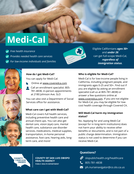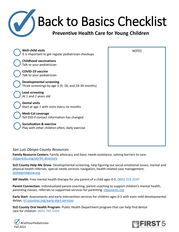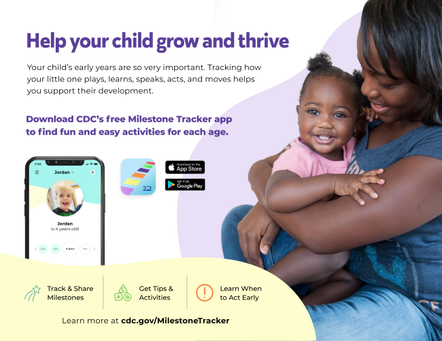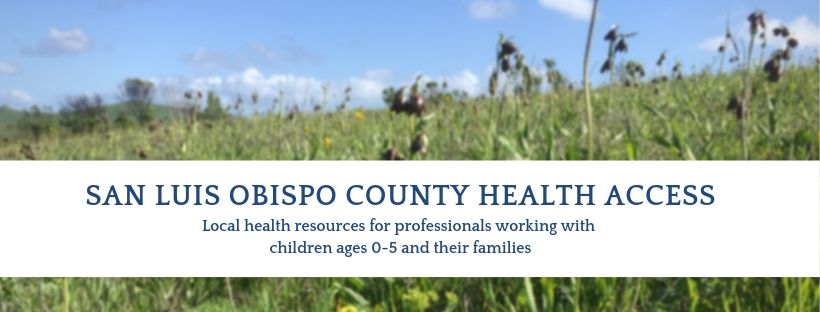Medi-Cal Continuous Coverage is Ending!

Early in 2020, eligibility renewals were temporarily waived to help people with Medi-Cal keep their health coverage during the pandemic. The continuous coverage has now ended and California is conducting eligibility renewals throughout 2024.
Here's how you can help clients maintain health insurance:
Who is eligible for Medi-Cal? Medi-Cal is for low-income Californians, including while pregnant and undocumented immigrants ages 0-25 and 50+. Adults without documentation ages 26-49 are eligible beginning January 1, 2024. How does one apply/re-apply for Medi-Cal?
Navigation Help to Access Insurance and Medical CareSLO County Public Health offers free Health Care Navigation Services for Medi-Cal, the Medically Indigent Services Program (MISP) and Covered CA. Services include:
In person: 2180 Johnson Avenue, San Luis Obispo Hours: Monday - Friday, 8am - 5pm Back to Basics: A Checklist for SLO County Children’s Physical and Emotional Well-Being
The covid pandemic has reduced the amount of preventive health care our youngest children are receiving. Many parents/guardians have avoided the pediatrician and dentist’s offices, never building habits of preventive care for their children. Preventive care is essential – it catches problems early and even stops problems from occurring.
This Back to Basics Checklist is a reminder for providers and families about the basic health care needs of children ages 0-5. It also includes key local referrals for developmental, dental, and mental health needs. You can support young children by keeping this checklist at your desk as a reminder when talking with families, or sending a copy home with each family you work with. Click here to download the Back to Basics Checklist in English and Spanish. |
Sign up for our monthly newsletters:
Read the last five newsletters here:
Free Medical Pop-Up ClinicA free SLO Medical Pop-Up Clinic provided by Vituity Cares is held on the third Sunday of every month. The clinic is for adults age 18 and older, no documentation or proof of financial eligibility required.
3rd Sunday of every month SLO Public Library, 995 Palm St, San Luis Obispo, CA 93403. (Located alongside Shower the People’s Mobile Showers.) FREE medical services for the underserved and unsheltered, including:
New Pediatric Clinic Accepting Medi-Cal
A new pediatric clinic is open and accepting patients who have Medi-Cal or private insurance. Dignity Health's Pismo Beach Pediatric Center and has bilingual staff. Parents can schedule appointments by calling 805-549-6915.
Looking for basic needs help?Contact an advocate or staff member at a Family Resource Center for support with non-medical needs such as food, clothing, shelter, parent education and navigating social services. A full listing of Family Resource Centers in San Luis Obispo County can be found here: https://sloparents.org/slo-frc-directory/
|

Back to Basics: Dental Care. You can share this flyer to remind parents of how important dental care is for young children. If a family needs help finding a dentist, contact the SLO County Public Health Department’s Oral Health Program at 805-781-5503 for assistance.
Well Child Visits and Developmental Milestones

When young children visit their pediatrician routinely at well-child visits, their doctor monitors their physical and emotional well-being, prevents severe illness with vaccinations, and screens for any developmental delays. For a well-child visit schedule from CenCal Health to give to families, click here.
If a child is not being screened for physical and social-emotional delays, their parent/guardian can:
1) Use the CDC Milestones app to learn about key developmental milestones at each age
2) Call SLO County Help Me Grow at 805-440-1878 for a free developmental screening using the ASQ (and the ASQ:SE for social-emotional concerns)
3) Call Tri-Counties Early Start at 800-456-4153 if they have a concern about a potential delay and would like a full assessment. Click here to download a brochure about the process and reasons to refer in English and Spanish.
You can help by posting and sharing about the CDC Milestones app poster and by referring families to Help Me Grow (referral form here) and Early Start (800-456-4153) when appropriate.
If a child is not being screened for physical and social-emotional delays, their parent/guardian can:
1) Use the CDC Milestones app to learn about key developmental milestones at each age
2) Call SLO County Help Me Grow at 805-440-1878 for a free developmental screening using the ASQ (and the ASQ:SE for social-emotional concerns)
3) Call Tri-Counties Early Start at 800-456-4153 if they have a concern about a potential delay and would like a full assessment. Click here to download a brochure about the process and reasons to refer in English and Spanish.
You can help by posting and sharing about the CDC Milestones app poster and by referring families to Help Me Grow (referral form here) and Early Start (800-456-4153) when appropriate.

The Health Access Training Project is a project of First 5 of San Luis Obispo County which advocates for quality programs and services to support children from prenatal to age five, ensuring that every child is healthy and ready to learn in school.
